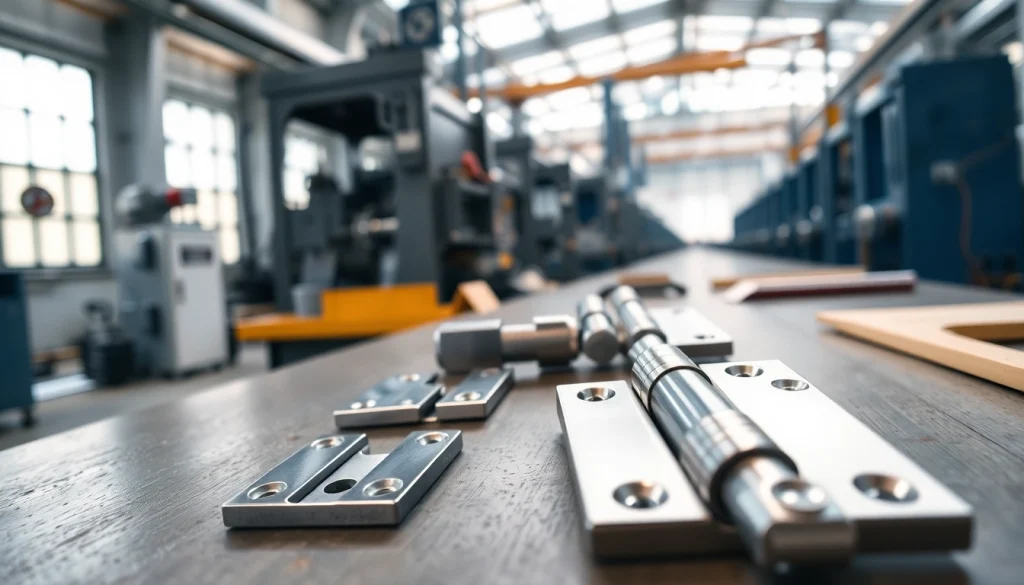
Understanding Door Hinges: A Comprehensive Guide
Door hinges are essential components of modern architecture, providing both functionality and aesthetic appeal to various door types. A reliable Door Hinges Manufacturer can significantly impact the quality and longevity of your door installations. This comprehensive guide aims to cover everything you need to know about door hinges, their applications, the importance of high-quality manufacturing, and how to choose the right manufacturer for your needs.
What Are Door Hinges?
Door hinges are mechanical devices that connect two solid objects, allowing for rotational movement between them. In the context of doors, they are the pivotal points that facilitate the opening and closing of a door while maintaining its stability when in use. Hinges can be made of various materials, including brass, stainless steel, and plastic, depending on their intended use and the weight they need to support.
Types of Door Hinges Available
Understanding the diversity of door hinges can greatly enhance your selection process, ensuring that you choose the perfect fit for your needs. Below are several common types of door hinges:
- Butt Hinges: The most common type used in residential and commercial doors. They feature two plates attached to the door and frame.
- Continuous Hinges: Also known as piano hinges, these are long and uniform, running the entire length of the door. They provide excellent support and are often used for heavy doors.
- Pivot Hinges: Ideal for heavy doors, these hinges allow the door to pivot at the top and bottom, offering a sleek appearance and a unique closing mechanism.
- Spring Hinges: These automatically pull the door closed after it has been opened, making them popular for commercial applications.
- Strap Hinges: Used primarily for gates or barn doors, these hinges extend beyond the width of the door for added strength.
Common Applications for Door Hinges
Door hinges find applications across diverse settings, contributing to functionality and security in various environments. Common applications include:
- Residential Doors: Utilizing standard butt hinges for entry and interior doors.
- Commercial Spaces: Employing high-capacity hinges for busy facilities with heavy foot traffic.
- Industrial Environments: Integrating specialized hinges in manufacturing and logistics to control heavy machinery doors.
- Outdoor Settings: Utilizing corrosion-resistant materials in hinges for gates and garden doors exposed to the elements.
The Role of a Door Hinges Manufacturer
A door hinges manufacturer is crucial in ensuring the quality, durability, and functionality of hinges that meet specific needs. The role encompasses various critical functions, from design to quality control.
Manufacturing Process and Quality Control
The manufacturing process for hinges typically involves several stages, including material selection, cutting, shaping, and assembly. Quality control is integral, often including testing for weight tolerance, movement fluidity, and durability. Manufacturers use rigorous testing to ensure compliance with industry standards.
Customization Options for Specific Needs
Many manufacturers offer customization options to cater to unique customer demands. This could include specifying the type of material, finish, size, and weight-bearing capacity of the hinges. Custom solutions can address specific architectural needs or aesthetic preferences.
Understanding Material Choices in Door Hinges
Door hinges can be manufactured from a range of materials, each offering distinct advantages:
- Steel: Often galvanized for rust prevention, it provides durability in high-traffic areas.
- Stainless Steel: Offers high resilience to corrosion and is ideal for both outdoor and indoor applications.
- Brass: Known for its aesthetic appeal, brass offers elegance and sturdiness, often used in residential applications.
- Plastic: Typically used for lightweight applications, plastic hinges can resist corrosion and are often employed in environments where moisture is a concern.
Benefits of Choosing Quality Door Hinges
Investing in high-quality door hinges yields several long-term benefits, impacting not just the longevity of the doors but also their operational efficiency.
Durability and Longevity of High-Quality Hinges
High-quality hinges are engineered to withstand repeated use without failure. Their durability reduces the need for frequent replacements, saving time and maintenance costs in the long run.
Cost-Effectiveness in the Long Run
The initial investment in quality hinges can seem higher than opting for cheaper alternatives; however, the decreased likelihood of wear and the enhanced operational reliability make them cost-effective over time. Robust hinges prevent damage to doors and frames, further saving costs associated with repairs.
Enhancing Aesthetic Appeal with Quality Hinges
High-quality hinges contribute to the overall beauty of a doorway. Available in various finishes and styles, quality hinges can complement the design of a home or commercial building, enhancing curb appeal and property value.
Key Factors in Selecting a Door Hinges Manufacturer
Choosing the right door hinges manufacturer is crucial to ensuring the quality of your door installation. Here are some key factors to consider:
Evaluating Manufacturer Expertise and Reputation
Researching a manufacturer’s history, expertise, and customer reviews can provide invaluable insights into their reliability and product quality. Look for established manufacturers with a proven track record in the door hardware industry.
Understanding Customer Support and Service
Business interactions don’t end with the purchase. Reliable customer support is essential for addressing issues or questions that may arise post-installation. Ensure that the manufacturer offers robust support, including warranties and return policies.
Comparing Products and Certifications
When selecting a manufacturer, be sure to compare their product offerings, paying attention to specific certifications that demonstrate adherence to industry quality standards. Certifications often provide quality assurance and validate the performance of their products.
Future Trends in Door Hinge Manufacturing
As the construction and hardware industries evolve, door hinge manufacturing is also experiencing transformative trends driven by innovation and consumer demands.
Innovations in Design and Technology
Advancements in technology are leading to innovative hinge designs that blend aesthetics with functionality. Smart hinges that integrate electronic locking systems are becoming popular in modern architecture, providing enhanced security and ease of access.
Sustainable Manufacturing Practices
In response to growing environmental concerns, many manufacturers are shifting towards sustainable practices. This includes using recyclable materials and adopting energy-efficient processes, aligning with consumer preferences for eco-friendly products.
Market Insights and Customer Preferences
Staying attuned to market insights and evolving customer preferences is essential for manufacturers. Tailoring products to meet consumer needs, such as customizable designs or specialized finishes, can enhance competitiveness in the market.






